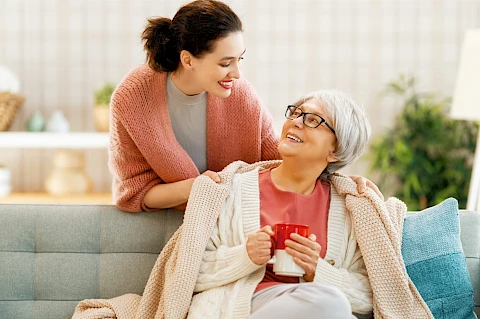
As winter approaches, it's necessary to ensure that the homes of seniors are safe and comfortable. Cold weather brings specific challenges, such as slippery pathways, higher energy costs, and potential power outages. These can pose risks to seniors, who may have limited mobility or other health concerns. That's why we've created this winter home safety checklist for caregivers. By following these tips, you can help keep your loved ones warm and secure throughout the season.
Heating and Ventilation
Staying warm is an essential aspect of winter home safety. It's vital to keep safety in mind when heating a senior's home. First, make sure the heating system is in good working order. Schedule regular maintenance checks and replace filters as needed. This will ensure efficient operation and reduce the risk of breakdowns during cold spells.
Keep a few safety tips in mind for space heaters or fireplaces. Place space heaters on a flat surface away from flammable materials, and turn them off when leaving the room. For fireplaces, always use a screen to catch embers and have chimneys cleaned regularly.
Proper ventilation is also essential to prevent carbon monoxide buildup, especially if gas heaters are in use. Make sure carbon monoxide detectors are working and install them in key areas, like near bedrooms.
Lighting and Visibility
Visibility is also essential to senior's winter home safety. As days grow shorter, lighting becomes more important to prevent falls and accidents. Ensure all indoor and outdoor areas are well-lit. Consider adding extra lamps or brighter bulbs in high-use areas like the kitchen and living room. Outdoors, motion-sensor lights can be great for illuminating walkways.
For nighttime safety, install nightlights in the bathroom, bedroom, and hallways. These simple additions can make a significant difference when seniors get up during the night.
Fall Prevention
To prevent falls inside the home, start by clearing obstacles from pathways and remove any rugs that can cause trip hazards. The installation of handrails and grab bars in the bathroom and along staircases can provide additional support where needed. Opt for non-slip mats in areas prone to moisture, such as the bathroom and kitchen, as these can prevent slips caused by wet floors.
Emergency Preparedness
Having an emergency plan is an important aspect of winter home safety, especially when winter storms can lead to power outages or travel restrictions. Create a checklist of emergency supplies, including food, water, medication, and first aid essentials. It is also beneficial to esure that all necessary contact numbers are easily accessible.
Communication is important during emergencies, so ensure phones or other communication devices are charged and within easy reach. Encourage your loved ones to keep charged battery banks on hand to keep phones working.
Additional Comfort and Safety Tips
Winter months can lead to dry indoor air, affecting comfort and health. Consider using a humidifier to maintain indoor air quality, which can help with dry skin and respiratory issues.
Keep seniors hydrated and nourished. Ensure that they have access to plenty of water and healthy meals. Foods rich in vitamins and minerals will support their immune systems throughout the season.
Lastly, make sure they have appropriate winter clothing. Layers are the best way to stay warm, so encourage them to dress in several lightweight pieces rather than one heavy sweater.
Stay Safe This Winter With Senior Helpers
By focusing on these areas, you can help ensure the safety and comfort of seniors during the winter months. We hope this winter home safety checklist will help caregivers like you manage potential risks and keep their loved ones secure.
If you need assistance with senior care, from drop-in companionship to light housework and personal hygiene, contact us at Senior Helpers Memphis. We proudly serve residents in Memphis, Bartlett, Germantown, and Collierville. Stay warm and safe this winter!